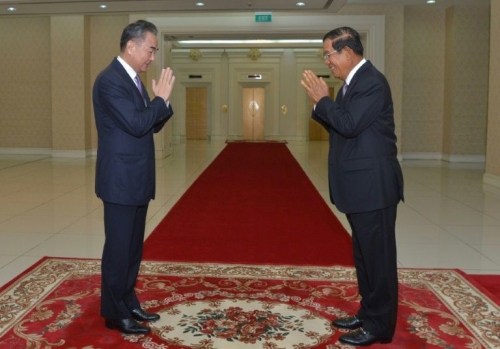China signs trade deal with Cambodia
China's top diplomat was in Cambodia Monday on the start of a visit both countries hope will boost relations at a time of increased tensions with the United States.
Foreign Minister Wang Yi -- who will also visit Malaysia, Laos, and Thailand on a regional charm offensive -- signed a trade deal that will allow Cambodia to export 340 mostly agricultural products without tariffs.
Beijing has all but replaced Washington as Phnom Penh's most important international partner, with the latest example just last week when a US-funded naval facility was razed as part of a new base being developed with Chinese aid.
Beijing has spent hundreds of millions of dollars in Cambodia as part of its global "Belt and Road" initiative, but new bridges and roads have been offset by what locals see as Chinese appropriation of local assets and resources, such as in Sihanoukville.
Hundreds of Chinese nationals have also been arrested in the past few years and charged with running massive online gambling schemes from Cambodia. Most are deported to face prosecution at home rather than face local courts.
On Monday, Wang and Cambodian strongman premier Hun Sen greeted each other with smiles and open arms before overseeing the signing of the new trade agreement.
Bilateral trade between China and Cambodia was worth $8 billion in 2019, but this deal should "push the exports up to $10 billion by 2023", commerce ministry spokesman Seang Thay told AFP.
It could also offset losses caused by the European Union re-imposing customs duties on Cambodian exports in August, said Hun Sen's spokesman Eang Sophalleth.
The EU's "Everything But Arms" agreement with Cambodia was suspended then over human rights concerns.
"The EBA will eventually end, but the China-Cambodia FTA will remain forever", Sophalleth quoted Hun Sen as saying.
One analyst said the impact of Wang's visit went beyond Cambodia.
Wang's visit will send a message that China is "a consistent predictable partner" to its Southeast Asian allies, said Sebastian Strangio, author of "In the Dragon's Shadow: Southeast Asia in the Chinese Century".
It will "underline the permanent nature of China's presence and interests in the region, compared to the fleeting and sometimes fickle engagement of the US," he told AFP.
Related Posts

